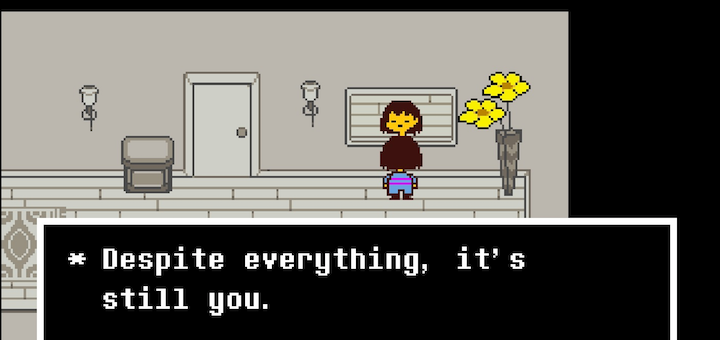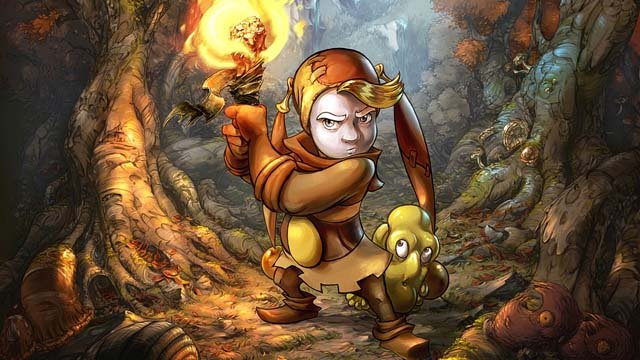CW for sexual violence in this post, and some of the content may be considered NSFW.
Earlier this week, Compulsion Games’ released a preview version of We Happy Few, the nightmarish dystopian game set in a drug-fueled alternate-reality 1960s England. As this game speaks to everything I love—weird visual styles, survival gameplay, thought-provoking world design—I raced to download the preview, and while it was loading, decided to watch a few game clips shared by the Xbox Live community. Turns out, I only saw one, because that one clip, which opened on a street populated by downtrodden, zombie-like figures, featured the player talking to and then bypassing a male NPC, only to turn and choke out a female NPC and simulate rape on her unconscious body as it lay in the street.
My partner and I had been talking about the game, sharing our excitement, wondering what would be included in the preview, and we fell silent as one in favor of simply staring at the screen. As the clip ended, we looked at each other, both asking half-formed questions: “Was that—?” “Did you see—?” He was finally the one who said, “I’m not sure that could be anything other than rape simulation.” He tried to replay it, just to verify, but the clip was already gone. Reported, probably, and well removed. But, I thought, what a lovely entrance into this game that had so excited me.
I got up and left. I walked around the house. I tweeted about it. I was mad, see, but not just because of what I’d seen—that mostly puzzled me; whose first impulse is to figure out whether or not you can fake-rape characters in a game?—but because in saying anything, in writing this, in fact, I will almost certainly be told I’m calling for censorship (though I do not think Compulsion Games should change anything), that I’m a humorless SJW, that I and other feminists are the cancer killing games. All because I’m not particularly overjoyed to have been subjected to a fake-rape clip. Because I don’t find it funny. Because I think it’s a sign that something may be very wrong with parts of our community.
Maybe it wasn’t meant to be funny—though I’m not sure why the person would have recorded it as a game clip if it wasn’t meant to be funny or shocking, or both. I’m not going to tell people how to play; in fact, I think an argument could be made for allowing people to play whatever they’d like in their own games. I don’t have to like it, and certainly I don’t want to see it, but there’s a case that could be made for games an outlet that allows some control for dangerous desires. In short, I’d rather someone simulate rape on NPCs, no matter how distasteful I find it, if it means they won’t rape a real someone in a real street. Research on this is not as robust as it could be—and I’m not surprised, considering I had to turn off safe search three times just to begin finding evidence; as a society, we struggle to even talk frankly about sex, sex crimes, and what causes the impulse—but studies have indicated a link between reduced impulse for sex crimes with an increase of simulated visual/participatory activities. Like porn. Like games. There are those, too, who say that such content promotes consent and healthy sexual exercise over violence. But the data is thin. No one’s really sure, just like they aren’t sure exactly how much simulated child pornography, such as cartoons and more, might help prevent pedophiles from acting on physical impulses and abusing actual children. Again, the data isn’t firm. We study so little of this frankly, and particularly in the case of pedophiles, no one wants to admit the urges in order to come forth and be studied. As much as I hate to say it, we often don’t know about someone’s urges unless they act on them. And that is a problem that prevents understanding. We’re also prevented from understanding the potential of victimless outlets, such as those that are digitally created.
Don’t get me wrong. I find discussing rape and pedophilia and all sorts of things enormously difficult. I understand that for others, it’s impossible, or close. Some of the things I read were downright frightening, such as the huge range that demonstrated potential pedophiliac reactions to stimuli. But there’s also so much that we don’t know about impulses and links, and that’s information we need. It’s information that the populations currently studied — typically, those who have already committed a crime, for a broad spectrum of reasons — may not give us. Too, we need to be able to study media, and video games, as possible routes to victimless therapy.
Though it’s hard for me to argue that simulating rape in a game like We Happy Few is victimless. Or rather, the public display of the clip was certainly not victimless; as distasteful as I found the act, doing whatever you want with NPCs in the privacy of your own game really isn’t anyone’s business, and may be comparable to the wanton slaughter and decimation many games require of us to proceed. I don’t know. Just doesn’t mean I want to see it the moment I look around the community on the Xbox. It’s fraught.
Here’s what I do know: talking about these issues and the potential for study could well result in the breaking down of content-creation barriers. That seems pretty anti-censorship to me. Right?
Which is part of why I find the recent Alison Rapp controversy so tragically fascinating. Rapp, as you may recall, is the former Nintendo Treehouse employee who was the subject of a harassment and smear campaign on social media, a campaign that brushed up against and was discussed in some GamerGate quarters, though the group (such as it is) as a whole denies involvement. What was one of the reasons Rapp was targeted, though?
She wrote an undergraduate thesis on the potential considerations swirling around the international pressure on Japan and the legality of victimless child pornography. Issues relating to those I was discussing above re: the potentials of created content. And Rapp was called a pedophile apologist, a potential pedophile, an actual pedophile, with graphics created accusing her of raping children. The content of her paper was twisted, spread around, used to draw others into the campaign, all in attempt to silence and discredit her for research performed years before, as an undergrad.
So where is the difference between hey, maybe this kind of content, and what people can do with/within it should be studied and hey, we know certain images reinforce negative impressions of those types of actual humans and those are some things that should be taken into consideration? Simple: one has been studied — we know the impact of media designed to cater to the male gaze, we know what it’s been linked to, we know the attitudes it can foster through repeated consumption. We don’t know if constructed media can be used to help mitigate dangerous urges. We can only guess from tenuous links, because it can’t be studied. At the end of the day, critics are saying, down the line, hey maybe we should consider the evidence, or get the evidence we need to do so.
Those are the very same discussions certain members of the gaming community, however, are attempting to silence or control. No, you can’t talk about the research and links between imagery, representation, and objectification. You’ll ruin games. No, you can’t talk about studying created media to help mitigate sex crimes and abuse because… well, I’m not sure what that reason really was, to go after Rapp. But certainly people wanted her stopped.
Let’s look at it another way, maybe a simpler way. Jennifer Hepler said she wasn’t a huge fan of combat in games, that she wanted to skip it, and the response was swift, loud, and violent. Note that the games she worked on in fact included combat. Were the games censored? Were they ruined? Or was Hepler’s life negatively impacted to an unearned degree? Were there attempts to silence her? To encourage her out of the industry, akin to the ways in which “censorship” is thrown around?
Anita Sarkeesian’s work has shined a spotlight on potential points of change in games, and in response, her detractors have spent years attempt to paint her as a fool, a criminal, a cancer killing games. Games, however, seem just fine.
A lot of words get thrown around by gaming communities—censorship, silencing, objectivity, privilege—without a lot of examination of what those concepts really mean, or whom and/or what they impact, when what we need is more, and deeper discussion. We don’t need to write critique off as censorship, but to consider it for what it is: discussion, examination, exploration, knowledge seeking. We need to stop pushing for objectivity and remember that we are all people, bringing experiences with us when we game, and taking more with us when we stop, and we need to consider those experiences, those privileges and limitations. We need to be able to discuss, and conduct research, even when it’s hard. Maybe especially when it’s hard, or when we don’t like it. How else do we solve anything?
As a postscript, I did get back around to trying out We Happy Few, and the idea of playing it like survival, of balancing drugs and societal expectation with actual surviving in a weird, dark world. I’m interested in seeing where it goes. But at the same time, covering up the dark truth with happy drugs and thin veneers of masks, well, that shit hits a little close to home, too, don’t you think?




